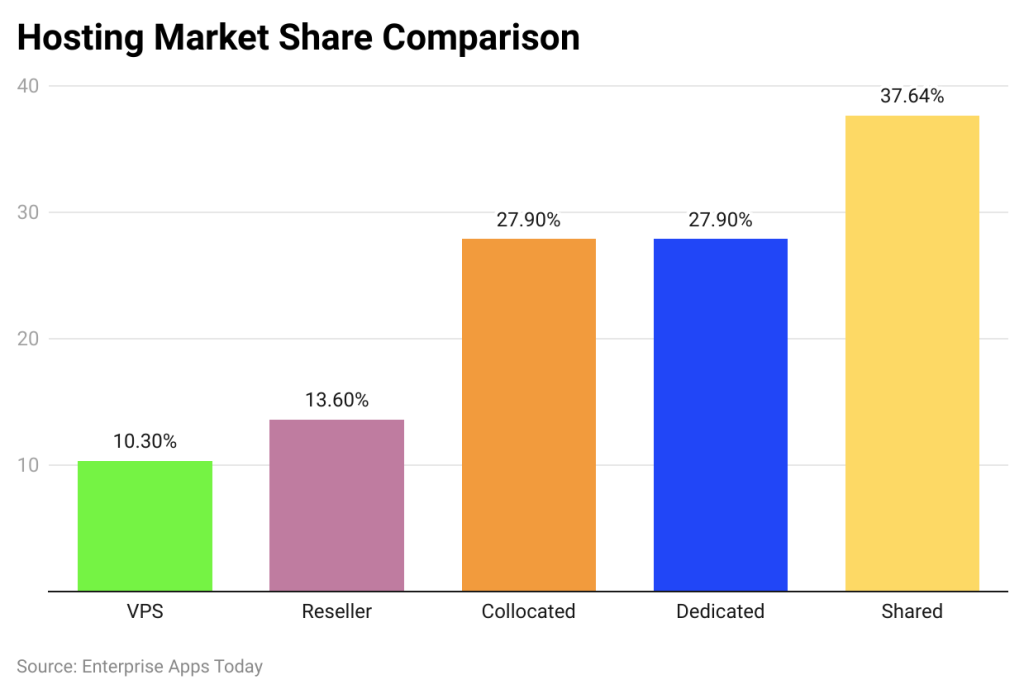Selecting the ideal hosting solution for your website is a pivotal decision that can profoundly affect your site’s performance, security, and scalability. With a multitude of hosting options available in the ever-evolving digital landscape, it’s crucial to make an informed choice that aligns with your specific needs. Two popular hosting choices that often come into consideration are shared hosting and WordPress hosting.
Shared Hosting
Shared hosting, a widely adopted web hosting solution, revolves around the concept of multiple websites sharing resources on a single server. These resources encompass the server’s processing power, memory, and storage. Shared hosting is renowned for its cost-effective nature and is aptly suited for websites with modest traffic and resource requisites.
B. Characteristics and features of shared hosting:
- Multiple websites sharing a single server: In shared hosting, websites coexist on a common server, efficiently sharing resources.
- Cost-effective pricing: This hosting solution offers a wallet-friendly option, particularly appealing to those with budgetary constraints.
- Limited resources allocated to each website: Resources such as CPU, RAM, and storage are allocated in a shared manner, ensuring fairness among hosted sites.
- Shared server maintenance and management: Server maintenance and management responsibilities are collectively borne, relieving individual site owners of these tasks.
- User-friendly control panels for website management: Shared hosting typically features intuitive control panels that simplify the process of managing websites.
- Ideal for small to medium-sized websites with moderate traffic: It is the ideal choice for websites with traffic that doesn’t impose excessive resource demands.
C. Advantages of shared hosting:
- Cost-effectiveness: Shared hosting is remarkably cost-effective, making it a welcoming haven for individuals and small businesses operating within tight financial confines.
- Easy setup and management: This hosting solution is thoughtfully designed for user-friendliness, equipped with control panels that streamline website management.
- Ideal for beginners and small websites: Shared hosting proves to be the perfect launchpad for newcomers to web hosting and accommodates the needs of small websites efficiently.
D. Limitations of shared hosting:
- Limited resources: Resource sharing among websites can lead to limitations, potentially affecting performance during resource-intensive operations.
- Performance issues during high traffic: Simultaneous surges in traffic across multiple websites on the same server can result in performance issues and slower loading times.
E. Real-life examples of websites using shared hosting:
- Personal blogs and portfolios
- Small business websites and startups
- Non-profit organizations and community sites
- Small e-commerce stores with manageable traffic
- Educational institution websites


Disadvantages of Shared Hosting
| Disadvantages | Explanation |
|---|---|
| Limited Resources | Since resources are shared, your website’s performance can be affected by the activity of other sites on the server. |
| Reduced Scalability | Shared hosting may not be suitable for high-traffic or rapidly growing websites. |
| Security Concerns | Security vulnerabilities on one site could potentially impact others on the same server. |
| Less Control | You have limited control over server settings and configurations. |
WordPress Hosting

WordPress hosting, the epitome of tailored hosting solutions, is engineered to provide an optimized environment for websites built upon the WordPress content management system (CMS). It is adorned with features and configurations specifically designed to elevate the performance and compatibility of WordPress sites.
B. Characteristics and features of WordPress hosting:
- Specialized for WordPress websites: This hosting solution is exclusively tailored for the unique requirements of WordPress-driven websites.
- Enhanced performance, speed, and reliability for WordPress: WordPress hosting is synonymous with top-tier performance, lightning-fast loading times, and unwavering reliability for WordPress sites.
- Customized server configurations for WordPress: Servers are meticulously configured to align with WordPress’s intricacies, ensuring a seamless and efficient experience.
- Built-in security features to protect WordPress sites: Security is paramount, with features such as firewalls and malware scanning standing guard to safeguard WordPress websites.
- WordPress-specific support and expertise: This hosting often comes with dedicated WordPress support, guaranteeing that WordPress-related queries find swift and accurate solutions.
- Typically higher in cost compared to shared hosting: The specialized nature of this hosting often reflects a higher price point.
C. Advantages of WordPress hosting:
- Optimized for WordPress websites: Websites hosted on this platform thrive in an environment that aligns seamlessly with WordPress’s unique requirements, translating into unrivaled performance and compatibility.
- Enhanced performance and speed: WordPress hosting propels websites into a realm of exceptional speed and efficiency, courtesy of meticulous server configurations.
- Built-in security features: Security concerns are addressed proactively, with robust security measures such as firewalls and malware scanning, ensuring the safety of content-sensitive websites.
D. Limitations of WordPress hosting:
- Higher cost: The specialized services and optimizations rendered by WordPress hosting come at a premium cost.
- Specialized for WordPress sites: While this hosting type is an impeccable choice for WordPress sites, it may not be as accommodating to websites utilizing other content management systems or custom-built platforms.
E. Real-life examples of websites using WordPress hosting:
- Prominent WordPress blogs and news websites
- E-commerce powerhouses built with WooCommerce
- Corporate websites and portfolios heavily reliant on WordPress functionality
- Any websites with advanced WordPress features and resource demands
Fcators to Consdier Before Choosing WordPress Vs. Shared Hosting:
1. Website Type:
WordPress hosting is crafted with precision for websites operating within the WordPress ecosystem. This hosting variant is finely tuned to optimize the performance and compatibility of WordPress-powered sites. In contrast, shared hosting takes on a versatile persona, adept at accommodating a diverse range of website types. It’s not confined to WordPress, making it a choice that spans a broad spectrum of online endeavors.
2. Budget:
WordPress hosting often carries a premium price tag due to the specialized services and optimizations it provides. While it’s a powerful choice, budget-conscious individuals or small businesses may find shared hosting more economically appealing. Shared hosting is celebrated for its cost-effectiveness, making it an attractive option for those operating with financial constraints.
3. Performance:
When performance takes the spotlight, WordPress hosting emerges as the shining star. It excels in handling high-traffic WordPress websites, offering an infrastructure meticulously optimized for speed and efficiency. In contrast, shared hosting is a reliable performer for low-traffic or moderately performing websites. However, during peak traffic periods, the sharing of resources can lead to marginally slower loading times.
4. Security:
WordPress hosting boasts a robust suite of security features, including firewalls and malware scanning. These attributes make it the secure haven of choice for sensitive websites, such as e-commerce platforms. Shared hosting also extends security measures, but the shared environment introduces certain security considerations. Depending on the nature of your website, additional security measures may be required.
5. Scalability:
The potential for scalability is another arena where WordPress hosting shines. It often includes scalability options, designed to accommodate rapid growth or sudden traffic spikes, making it ideal for websites with ambitious expansion plans. Shared hosting, conversely, presents limitations in this regard, rendering it less suitable for websites with aggressive growth objectives.
6. Technical Knowledge:
WordPress hosting is designed with user-friendliness in mind. However, having some technical knowledge can be beneficial, especially if you wish to make custom configurations or optimizations. Shared hosting, in general, is straightforward and user-friendly, making it accessible to individuals with limited technical expertise.
7. Website Management:
WordPress hosting simplifies website management, offering tools and features specifically tailored for optimizing WordPress sites. Shared hosting, with its broader application compatibility, is versatile and suitable for managing various types of websites.
8. Support and Resources:
In terms of support, some WordPress hosting providers offer specialized assistance for WordPress-related issues, enhancing the user experience. Shared hosting providers offer general hosting support suitable for a wide array of website types.
Conclusion:
In conclusion, the decision between shared hosting and WordPress hosting hinges on various factors, including your website’s size, traffic expectations, budget, and specific needs.Assess your requirements, explore the frequently asked questions, and carefully consider the unique needs of your website. Whether you opt for the accessibility of shared hosting or the specialized advantages of WordPress hosting, remember that selecting the right hosting solution is a pivotal step towards a successful online presence.
FAQs on WordPress Vs. Shared Hosting:
Is shared hosting suitable for high-traffic websites?
Shared hosting may struggle to handle high-traffic websites efficiently. If your site experiences consistent high traffic, consider WordPress hosting or a VPS (Virtual Private Server).
Can I switch from shared hosting to WordPress hosting?
Yes, you can migrate your website from shared hosting to WordPress hosting. Most hosting providers offer migration services or plugins to simplify the process.
What if I’m on a tight budget but want to use WordPress?
If you’re on a tight budget and want to use WordPress, you can start with shared hosting and later upgrade to managed WordPress hosting as your website grows.
Is WordPress hosting suitable for e-commerce websites?
Yes, WordPress hosting can be an excellent choice for e-commerce websites, especially when paired with e-commerce plugins like WooCommerce. It offers better performance and scalability.



